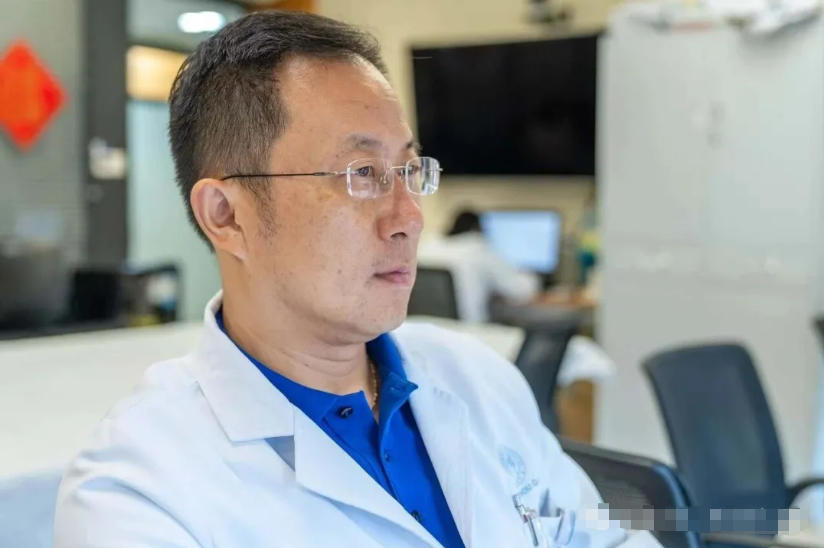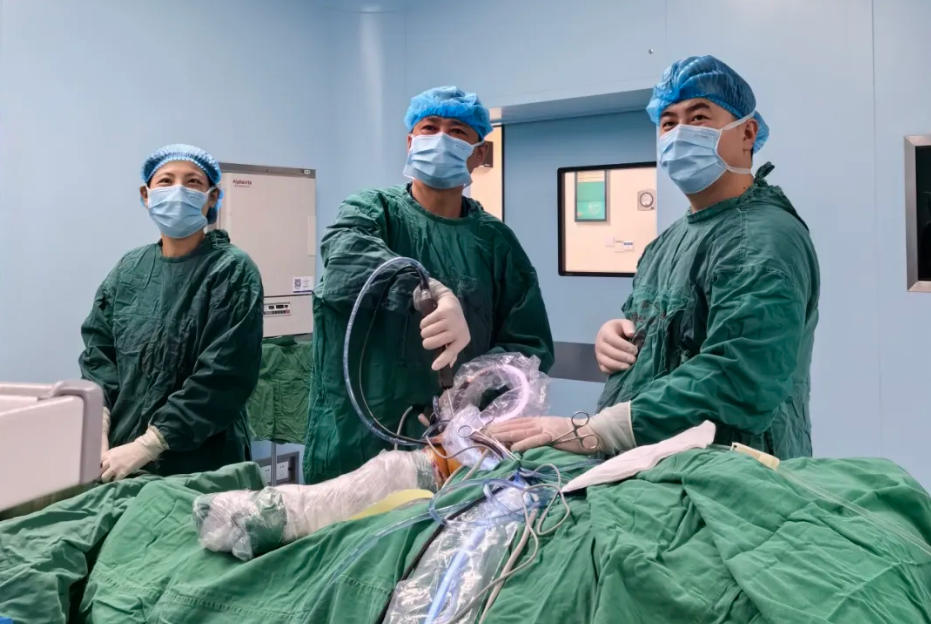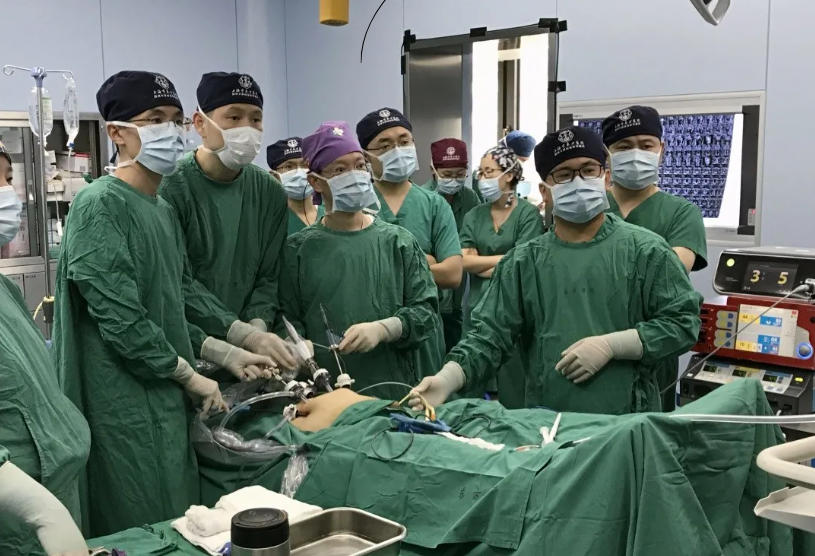Update time:2024-10-28Visits:16979

Wan Rong, MD, Chief Physician, Doctoral Supervisor.
Executive Director of Department of Gastroenterology (North Branch), Chief of General Internal Medicine, Head of Internal Medicine Teaching and Research Section at Shanghai Jiao Tong University Affiliated First People's Hospital.
Associate Professor at Shanghai Jiao Tong University; Visiting Professor at Nanjing Medical University and Soochow University.
Visiting Scholar at Columbia University Medical Center, USA; Visiting Scholar at Kyushu University Hospital, Japan.
Recipient of multiple talent programs including Shanghai Outstanding Academic Leader, Shanghai Health System New Hundred Talents Program, etc.
Specializes in the diagnosis and treatment of various gastrointestinal disorders, particularly biliopancreatic diseases; expert in endoscopic procedures.
Principal investigator or participant in sub-project of National 863 Program, 3 NSFC general projects, National Key Specialist Construction Project of the Ministry of Health, Shanghai Municipal Science and Technology Commission Key Project, and Shanghai Natural Science Foundation.
Authored over 30 medical papers with an aggregate impact factor exceeding 100.
Co-authored 6 textbooks and academic works.
Supervised over 20 doctoral and master's students.
Memory
As time flies, we mark the 160th anniversary of Gongji Hospital's founding, coinciding with the 40th anniversary of the Gastroenterology Department's establishment.
"Working at Shanghai First People's Hospital has been an enormous privilege. Over six generations of department directors, our Gastroenterology Division has thrived through both inheritance and innovation. The future holds even greater promise for our department – a journey worth embarking on together with my colleagues."
During a casual conversation with Dr. Wan Rong, Chief of General Internal Medicine at Shanghai First People's Hospital, stories emerged of relentless dedication by generations of medical pioneers. Their wisdom and efforts laid the foundation for this institution, bringing hope and renewal to countless patients. Since its inception, the Gongji Gastroenterology Department has grown from infancy to excellence under successive directors, earning its distinguished reputation through exceptional medical expertise and compassionate care.
It is these personal stories woven into the fabric of history that evoke profound respect and warmth for medicine. Capturing and sharing these touching legacies feels not only meaningful but essential – a testament to memories worth preserving...
Preface
Three years have passed, yet his countenance now bears a patina of maturity and wisdom forged by time.
When we first met, his humorous confidence and animated descriptions of navigating endoscopic frontiers revealed a man thoroughly immersed in his craft. Today, he stands as a navigator – quick-witted yet with an unflinching gaze that betrays growth extending beyond technical mastery into profound life insights.
"Upon reaching fifty, one begins to understand the mandates of fate. The future belongs to the young," he reflects. "Watching their fearless innovation evokes both awe of time's passage and resolve to nurture their potential. Creating opportunities for them to ride the waves of discovery is the true fuel for sustaining our collective mission."

"My Drean, My Road"
Dr. Wan Rong still remembers his grandfather's words: "Medicine offers a lifelong skill, a means of livelihood, and an opportunity to accumulate virtue through saving lives."
His grandfather, once an apprentice in a traditional Chinese medical clinic, became a respected physician in Yichun after years of dedication. Young Wan Rong often watched his grandfather traverse alleyways, his back bearing the weight of healing. During a measles epidemic, crowds flocked to him for treatment, earning him the nickname "Divine Healer."
Medicine is a discipline of heritage, encompassing not just technical skills but the absorption of essence, energy, and spirit.
In 1989, Dr. Wan Rong entered Nanchang University School of Medicine, igniting his medical journey.
Established in Jiangxi Province's capital city during China's turbulent 1940s, the school saw students kindle medical aspirations amid hardship. Through subsequent transformations and name changes, it became "Nanchang Medical College" in 1958.
As Jiangxi's leading medical institution, it flourished post-1949 – especially during the Reform and Opening-up era – emerging as a beacon of medical education and research. Here, scholars pursued healing arts with dedication, from dawn study sessions to late-night research, nurturing both medical expertise and compassionate hearts.
Dr. Wan Rong immersed himself in studies, earning trust through diligence.
Upon graduation, he joined the First Affiliated Hospital of Nanchang University, spending eight formative years there. These years deepened his understanding of life's fragility and resilience, solidifying his focus on gastroenterology. Passionate about improving patient outcomes, he dedicated himself to advancing diagnostic and treatment techniques.
In 1996,Dr. Wan Rong's first encounter with digestive endoscopy marked a career turning point. This technology not only revolutionized gastrointestinal care but also ignited his intellectual curiosity. Through intensive study and practice, he mastered this emerging field.
Go Shanghai
In 2002, Dr. Wan Rong enrolled as a doctoral candidate in Gastroenterology at Shanghai Ruijin Hospital, continuing his medical education in Shanghai.
He understood that medicine's path is endless – only through relentless advancement could he better serve patients. New challenges awaited, but he pressed forward with unwavering resolve.
At Ruijin Hospital, a century-old institution, Dr. Wan Rong was deeply inspired by the integrity of elder scholars like Professors Tang Zhenduo, Xu Jiayu, and Jiang Shihu. Guided by his advisors, Professors Wu Yunlin and Yuan Yaozong, and departmental mentors, he made significant strides in research, clinical practice, and endoscopic techniques. During his doctoral studies, endoscopic technology rapidly advanced in China, expanding into therapeutic applications.
Upon graduation, he joined the Gastroenterology Department of Shanghai First People's Hospital as part of Professor Wang Xingpeng's team.
"The hospital aimed to elevate its endoscopic capabilities – that's why I came here."
In August 2005, Dr. Wan Rong underwent several months of advanced training at Changhai Hospital Gastroenterology Department under Academician Li Zhaoshen, entering the emerging field of ERCP (Endoscopic Retrograde Cholangiopancreatography). This minimally invasive technique involves inserting an endoscope into the duodenum to visualize pancreaticobiliary ducts with contrast agents, now widely used for its low trauma, short procedure time, and reduced complications.
Following Professor Zheng Ping's recommendation, he focused on mastering ERCP.
"Early ERCP focused on diagnostic purposes, but technological progress has transformed it into an interventional tool. Modern ERCP combined with endoscopic ultrasound not only supports gastrointestinal care but also strengthens other specialties."
As one of the most challenging gastrointestinal techniques, ERCP became a field where Dr. Wan Rong and his team achieved numerous breakthroughs. His early experiences at Nanchang University First Hospital laid a solid foundation, while ERCP unlocked his passion and sense of purpose, saving countless patients with biliary disorders.
ERCP requires precise decision-making under X-ray guidance. Though initial attempts kept him awake at night, hundreds of procedures later, he gained mastery.
"ERCP has over 60 indications, enabling innovative treatments that often eliminate the need for surgery."
One notable case involved a critically ill 101-year-old patient with suppurative cholangitis. Dr. Wan Rong proposed a radical solution: endoscopic stent placement to relieve obstruction without traditional surgery.
His unconventional approach challenged norms, but his deep medical knowledge and patient assessment convinced him this was the optimal – perhaps only – option.
"I explained the procedure's necessity and risks thoroughly to her family. Initial hesitation turned to trust as I emphasized this was their loved one's best chance."
The 20-minute operation succeeded, removing stones and saving the centenarian. Later, a heartfelt handwritten thank-you note arrived.
"To me, that letter ranks among life's most precious gifts. Every word carried gratitude, validating my calling."
Dr. Wan Rong remains acutely aware that medical decisions hold lives in balance, driving his pursuit of excellence.
"Another 90-year-old patient with atypical biliary obstruction stands out. His children immediately accepted ERCP and provided exceptional care. After recovery, he invited me to his birthday party – though he may not recall my name, he repeatedly said, 'Doctor Wan saved my life.'"
In those moments, "Doctor Wan" transcends a title, becoming a symbol of trust and hope.
Growth with New Endo-Tech
Disciplinary advancement hinges on innovation and intentional exploration. Under Dr. Wan Rong's leadership, the department has achieved endoscopic breakthroughs across multiple fronts.
"Over recent years, our department has significantly advanced techniques like ERCP, ESD, EUS, EVL, POEM, and NOTES. The application of NOTES (Natural Orifice Transluminal Endoscopic Surgery) in particular minimizes patient discomfort and accelerates recovery by accessing body cavities through natural orifices, avoiding traditional surgical trauma."
Dr. Wan Rong has pioneered NOTES applications, combining theoretical research with clinical experimentation. Using this technique, his team successfully performed minimally invasive treatments for hepatic cysts and gallbladder polyps, drawing widespread attention.
"I vividly recall our first NOTES procedure on a 73-year-old patient suffering from a six-year-old hepatic cyst. We relieved her condition via endoscopic transgastric hepatic cyst deroofing."
The patient resumed normal diet the next day with no visible scars. This achievement was published in ENDOSCOPY, earning international recognition.
Innovation continued the following year when Dr. Wan Rong applied NOTES to simple hepatic cysts using endoscopic transgastric hepatic cyst deroofing (ETGHCD). This minimized trauma, enabling a patient with a massive cyst to be discharged within two days.
NOTES provides patients with advanced, less invasive options, reducing physical burden and postoperative risks.
"Previously, a patient with a long-term hepatic cyst faced conventional surgery. NOTES allowed us to achieve minimally invasive treatment, significantly improving outcomes."
These innovations demonstrate NOTES' potential in managing benign hepatic lesions, offering valuable reference for future cases.
In another gallbladder polyp case, Dr. Wan Rong used NOTES to preserve gallbladder function while removing polyps in a 33-year-old patient. The scarless procedure was widely reported.
"These successes validate NOTES' promise and inspire further exploration. We believe advancing technologies will bring greater benefits to patients."
Dr. Wan Rong emphasizes patient-centered progress: "Every medical decision involves balancing success rates with long-term quality of life. Surgeries are dialogues with life – physicians must use both skill and compassion to ignite hope."
40 Years History of Gongji Gastroenterology
Looking back on Gongji Hospital's 160-year legacy, every medical professional takes pride in its history. Over the past four decades, the Gastroenterology Department has evolved from humble beginnings into a powerhouse of exploration, innovation, and excellence.
As today's department leader, Dr. Wan Rong attributes the Shanghai First People's Hospital Gastroenterology Division's success to six generations of directors' collective efforts.
"The roots of Gongji's internal medicine trace back to Professor Le Wenzhao, founder of Shanghai Medical College. In the 1980s, Professor Wu Xiening established our Gastroenterology Department – a visionary who studied under Academician Jiang Shaoji, a giant in digestive medicine. Professor Wu integrated Chinese and Western medical approaches, pioneering combined therapies for diarrhea and inflammatory bowel disease. His bold innovations provided new treatment paradigms. Crucially, he secured the Shanghai Key Laboratory of Pancreatic Diseases for our hospital, a landmark achievement."
Professor Wu's contributions extended to acute severe pancreatitis treatment, significantly reducing mortality through integrative medicine.
Second director Professor Wang Guoliang revolutionized liver disease and ulcer management, shifting many conditions from surgical to medical treatment. Under his leadership, the department also excelled in Helicobacter pylori therapy.
Third director Professor Wang Xingpeng bridged eras, codifying traditional Chinese medicine protocols for acute pancreatitis in national guidelines and establishing a doctoral training system that nurtured generations of scholars.
Current academic leader Professor Lu Lungen continues driving breakthroughs in hepatology, solidifying the department's reputation in liver disease research.
"Each director's contributions form our department's DNA, laying foundations for today's achievements."
As Executive Director, Dr. Wan Rong shoulders dual responsibilities: upholding this legacy while advancing innovation.
On July 3, 2023, the hospital's new Building 7 (Hongkou Campus) opened, expanding Gastroenterology's capabilities.
"Our department now focuses on integrated care – spanning outpatient services, inpatient care, research, and education. This holistic approach ensures seamless patient journeys."
Floor 21st houses the integrated outpatient clinic, co-locating specialists for efficient diagnosis and treatment. Floor 22nd hosts dynamic research labs where doctoral students and scientists tackle digestive disease mechanisms.
"The integration isn't just physical – it reflects a philosophical shift toward cohesive, patient-centered care. From two endoscopes to a 20-unit center, this evolution symbolizes our leap in technical sophistication and patient care."
The center now implements Dr. Wan Rong's vision of SOPs,encompassing: 1.Pre-admission education programs; 2. Inpatient personalized treatment plans; 3. Post-discharge follow-up protocols.
Reflecting on Gongji's 160th anniversary, Dr. Wan Rong emphasizes:
"The Gongji Spirit – a philosophy of public service, innovation, and heritage – unites us across generations. With four generations of physicians working together, we carry forward this torch as we strive to become a leading research-intensive hospital. I am confident Gongji's next chapter will be even more brilliant."
Note: Gongji was the name of Shanghai General Hospital (Known as another name of Shanghai No.1 People Hospital) .

ShanghaiDoctor.cn:
Q: Could you talk about the advantages and characteristics of the Gastroenterology Department of Shanghai General Hospital in your mind?
Dr. Wan Rong:
A: The characteristics and advantages of our Gastroenterology Department are reflected in many aspects. Firstly, our department has a long history. It was established in the early 1980s and has undergone 40 years of development. Our team has in-depth research and treatment experience in inflammatory bowel diseases and pancreatic diseases. Especially in the treatment of severe acute pancreatitis, we have adopted traditional Chinese medicine formulas and achieved remarkable results. In addition, we also have the Key Laboratory of Pancreatic Diseases under the Shanghai Science and Technology Commission, which provides strong support for our scientific research and clinical treatment. Through the joint efforts of several generations of people, the Gastroenterology Department has formed unique treatment characteristics, covering the diagnosis and treatment of hot and difficult diseases in the field of gastroenterology.
ShanghaiDoctor.cn:
Q: What do you think are the most significant changes, both in terms of technical aspects and in your personal development as well as the development of the department, since the last interview?
Dr. Wan Rong:
A: Several years have passed. Since the last interview, our Gastroenterology Department has changed a great deal. Externally, the scale of our department has increased and the environment has been improved, and we now have an independent digestive endoscopy center. However, when it comes to the connotation, there have been even more changes. For example, we have now witnessed a change in the organizational structure. We cover all types of surgeries, including some pioneering technologies. We also focus on quality rather than simply pursuing quantity. Especially after the pandemic, we have paid more attention to how to provide higher-quality services for patients and solve the problem of expensive medical treatment.
ShanghaiDoctor.cn
Q: How do you view the future development direction of the Gastroenterology Department?
Dr. Wan Rong:
Q: The future development direction of the Gastroenterology Department should be multi-faceted. Firstly, endoscopic technology will continue to develop and it will become an important supporting point for the diagnosis and treatment in the Gastroenterology Department. The development of endoscopic technology will enable us to observe further, deeper and more realistically, thus improving the accuracy of diagnosis. Secondly, we will place more emphasis on teamwork, including the collaboration between internal medicine and surgery, as well as interdisciplinary cooperation with other disciplines. In addition, we will also focus on the integration of scientific research and clinical practice. We will promote the progress of clinical treatment through scientific research, and at the same time, we will also pay attention to the overall health of patients.
ShanghaiDoctor.cn
Q: How do you view the role of medical - engineering intersection in the development of the Gastroenterology Department?
Dr. Wan Rong
A: The intersection of medicine and engineering plays a very important role in the development of the Gastroenterology Department. Through the integration of medicine and engineering, we can apply the principles and technologies of engineering to medical practice, thus improving diagnostic and treatment techniques as well as medical materials. For example, we can use new materials to improve endoscopic equipment, making it more precise and efficient. In addition, the intersection of medicine and engineering can also help us develop new treatment methods. For instance, we can develop absorbable stents through biomaterials engineering, or use AI technology to assist in diagnosis and treatment. This interdisciplinary cooperation will drive the innovation and development of the Gastroenterology Department.
ShanghaiDoctor.cn
Q: Will you engage in more popular science work regarding diseases in the Gastroenterology Department?
Dr. Wan Rong
A: Our department has always attached great importance to popular science and has previously carried out publicity work through various media. Digestive system diseases are a category of diseases that involve the digestive system, including gastroesophageal reflux, gastritis, peptic ulcer, inflammatory bowel disease, pancreatitis, etc. Take gastroesophageal reflux as an example. It is a common digestive system disease, and patients may experience symptoms of gastric acid refluxing into the esophagus, such as chest pain, cough, sore throat, and so on. Many people may mistake it for a respiratory disease, but in fact, it is related to the dysfunction of the digestive system. For such diseases, we need to enhance the public's awareness of popular science, help them understand the real causes of the diseases, and take the correct treatment measures.
Editor: Qing Chen, ShanghaiDoctor.cn
Dr. Zhou Qianjun | ““Sculpting Life in the Chest” – A Portrait” – A Portrait
Dr. Cai Junfeng | Guarding Bone and Joint Health, Improving Quality of Life
Dr. Xu Xiaosheng|The Gentle Resilience of a Male Gynecologist
Dr. Shi Hongyu | A Cardiologist with Precision and Compassion
Dr. Zhang Guiyun|The Inspiring Path of a Lifesaving Physician
Dr. Chen Bin | Building the Future of ENT Surgery at Lingang,Shanghai
Prof. Zhang Baigen | The Oral History of China’s Vascular Surgery

Dr. Zhou Qianjun | ““Sculpting Life in the Chest” – A Portrait” – A Portrait

Dr. Cai Junfeng | Guarding Bone and Joint Health, Improving Quality of Life

Dr. Cui Xingang | The Medical Dream of a Shanghai Urologist

Dr. Xu Xiaosheng|The Gentle Resilience of a Male Gynecologist

Dr. Shi Hongyu | A Cardiologist with Precision and Compassion

Dr. Zhang Guiyun|The Inspiring Path of a Lifesaving Physician

Dr. Jiang Hong | Bringing Hope to Vascular Frontiers

Dr. Huang Jia | A Journey of Healing "Breath"

Dr. Chen Bin | Building the Future of ENT Surgery at Lingang,Shanghai

Prof. Zhang Baigen | The Oral History of China’s Vascular Surgery